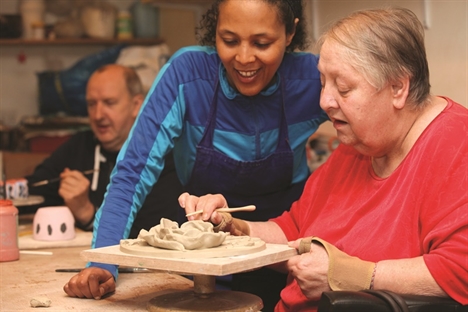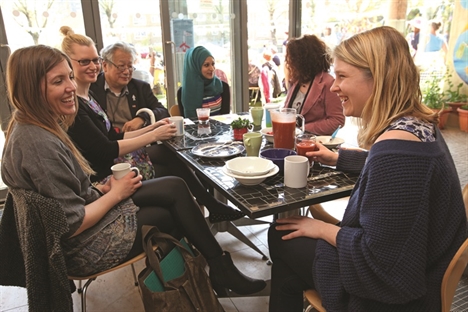04.02.14
‘Once you’re seeing someone who’s unhealthy, it’s already too late’
Source: National Health Executive Jan/Feb 2014
Social prescribing is taking off, with experiments around the country proving its value in settings as varied as Newcastle-upon-Tyne, rural Devon, and Hackney. Its pioneer was the Bromley by Bow Centre in Tower Hamlets, which is now considering expanding it across the whole borough. NHE spoke to the health and community centre’s strategy director, Dan Hopewell.
Social prescribing has been defined as providing a “formal means of enabling primary care services to refer patients with social, emotional or practical needs to a variety of holistic, local non-clinical services”. It is still in the ‘early adopter’ stage rather than mainstream, but it is certainly becoming more common around the NHS.
It has been used by the pioneering Bromley by Bow Centre in east London for many years, and in January 2013 it was expanded to its four neighbouring GP surgeries, who after a six-month pilot have now adopted it as business-as-usual.

A social prescriber co-ordinator receives every social prescription made by every GP, nurse or healthcare assistant, and does the job of deciding which service would be most appropriate for that patient and helping them access it. The healthcare professional just has to use a standard referral form embedded on their computer and send it to a single email address, monitored by the social prescriber co-ordinator.
The centre’s strategy director, Dan Hopewell, explained: “That form draws off patient data from EMIS so they don’t have to laboriously type in the patient’s personal details. “That form is then emailed to that single email address, irrespective of the specific service they’re referring that patient to. It could be money management, it could be adult learning, getting a job, joining a timebank, a cooking group in the neighbourhood, or whatever it happens to be. They don’t have to think ‘Which organisation provides that service? Where’s their email address?”
Open and exploratory questions
That social prescriber, who was initially funded from an innovation bursary from the local CCG but who is now funded directly by the five GP practices involved, will usually phone the patient to discuss the referral in more detail and ensure they understand it.
Hopewell said: “They will also engage in some more open and exploratory questioning to see if there are other things the patient might be interested in. We have one patient, for example, who was referred for a community-based weight management programme, but it transpired their neighbour’s flat had flooded a few weeks earlier, and that they had lost their furniture and clothing. They had no contents insurance, and their life had basically become a disaster just a few weeks earlier.
“That hadn’t been detected by the GP making the weight management referral, but through open and exploratory questioning the social prescriber co-ordinator was able to pick that up, and at that point swung a whole lot of other things into action to support that person. That’s not uncommon.”

More than medicine
Social prescriptions can be directly related to someone’s health, for example with weight management, but this is not always the case – referrals to do with employment support, for example, or debt advice.
Some may question whether it is really a GP’s role to be involved in these issues at all, but Hopewell said: “Once you’re seeing someone who’s unhealthy, it’s already too late. The premise of social prescribing is that you can help with the social determinants of health, which are potentially the biggest drivers of ill-health.”
That includes people’s skill levels, their education and qualifications, their neighbourhood, their social connections, their support networks, their housing (whether it is overcrowded or lacks heating, for example) and poverty itself.
Hopewell explained: “Improving those social determinants of health is not within the gift of a GP, or a nurse, or a healthcare assistant – and it isn’t something that can happen in the consulting room. A GP can’t improve someone’s skills or get them a job or get them out of a damp, ill-heated, overcrowded flat into a more spacious property.
“But there are a whole host of agencies around who do precisely that sort of work, from the Citizen’s Advice Bureau to organisations supporting people into employment, to adult learning providers. There’s a whole series of initiatives helping to reduce social isolation – which is a huge driver of ill-health. It’s been said that being lonely is more damaging to your health than smoking 15 cigarettes a day.
“But GPs spend most of their time in tiny little consulting rooms and hardly step out of their buildings and hardly have any relationships in the communities they work in. Your average GP doesn’t know the name of the headteacher of the primary school over the road from the GP practice, much less the name of the parent liaison worker in the playground every morning talking to the mums and dads. So the function of the social prescriber is to reset the GP function; to get GPs, nurses and healthcare assistants to understand their jobs very differently.”
That means moving beyond immediate clinical health needs, to seeing patients as rounded individuals who have other things going on in their lives. Poor literacy, poor IT skills, debt and money worries, loneliness, poor nutrition – all these things are likely, sooner or later, to have an effect on their health.
The model obviously has strong links with the aims of the Self Care Forum (see page 41). Hopewell and his colleague at the centre,
Dr Sam Everington, who is a SCF board member, gave a presentation at the Self Care Conference in November explaining social prescribing in more detail.
Expanding the scheme
When the social prescribing model was rolled out to more GP practices in Tower Hamlets last year, the first step was educating GPs about the concept and training them to use the single referral form – a simple process.
There are now about 33,000 patients in the area whose GPs use social prescribing, still going to the same email address. The co-ordinator receives between 25 and 50 a week, Hopewell said, which he called “quite a significant volume”.
There has not yet been a formal evaluation, but anecdotally there has been lots of value to individual patients, Hopewell said.
He explained that in general, the most health-related ‘prescriptions’ (e.g. healthy eating and exercise) have been the most successful, while the 10-15% on social welfare advice (such as adult learning and employability) need more work.
He said: “Those are the areas that are furthest from the normal GP conversation with the patient, and probably the areas we need to do more on in terms of supporting GPs to develop their open conversational skills. There is a time factor – GPs have a limited amount of time in each consultation with their patients.”
He suggested that with many traditional community support networks breaking down or long gone, with less attendance at or conversation in churches, post offices, pubs and corner shops, “there are fewer places where people can talk about things going on in their lives and pick up that ‘casual support’ from other people”.

But many people have a long-term relationship with a GP, and their doctor becomes someone with whom they can discuss their problems.
“That’s probably a factor that drives high consultation rates for quite a number of people: they simply have very few other people to talk to. Anything up to 25% of GP consultations may be inappropriate; though there’s a scale of ‘inappropriateness’.
“Part of this is about giving the GPs access to a whole series of services and groups and facilities that are in their neighbourhood but that they may be completely unaware of.”
Hopewell said he is sure that many other parts of the country will soon take up social prescribing if they haven’t already, and indeed recent Nesta / People Powered Health research (see NHE May/June 2013 for more on PPH) suggested that 80% of 1,000 GPs surveyed thought social prescriptions should be available.
Among the public, 9% said they had received a social prescription, though more than half would like them to be offered.
‘Like having an extra pair of arms’
Bristol is another city looking at social prescribing, and recently commissioned Dr Richard Kimberlee, senior research fellow in Health and Applied Social Sciences at UWE, to examine the evidence. In his report for Bristol Health & Wellbeing Board, he quoted a local GP as saying: “In health we are often quick to judge, slow to listen, and feel too busy to care in the way we would want to. Having [a local social prescribing project] as a partner in our striving to deliver good care for our registered population is like having an extra pair of arms. The team are amazing in their resourcefulness and we are very much richer for the work they are doing.”
His report describes four models of social prescribing: from basic signposting, through ‘light’, ‘medium’, to ‘holistic’ – the most formal and person-centred model, also known as the ‘Bromley by Bow model’.
Such a model cannot easily be commissioned, he suggests, but instead has to grow organically, and be developed over time, “with optimum effectiveness resting on the quality of the partnership between the social prescriber and the practices”.
Tell us what you think – have your say below, or email us directly at [email protected]